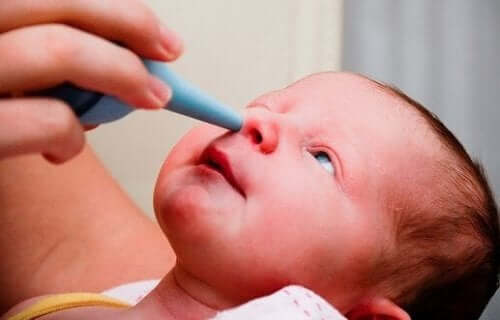Everything You Need to Know About Enterovirus Infections

As parents, we never want our children to get sick, and to avoid this, we’re capable of doing the impossible. Our efforts are important, but we won’t always be able to keep them away from this reality because their immune system isn’t always strong enough to fight, for example, enterovirus infections.
This group of viruses is very common and, in most cases, they only involve mild discomfort. They belong to the Picornaviridae family, which means small “beak” and “RNA” for ribonucleic acid. Due to their characteristics, they’re divided into four main subgroups:
- Aphthovirus. This is an animal pathogenic virus.
- Cardiovirus. Like the previous one, it has no human origin.
- Enterovirus. Poliovirus, Coxsackievirus A1-A24, Coxsackievirus B1-B6, Echovirus 1-34, and Enterovirus 68-71.
- Rhinovirus. These are sub-classified from 1 to 100.
Although these data are a bit difficult to understand, it’s important that we know the diversity of this virus that attacks relentlessly, especially when it comes to the smallest member of the household. Each of these types generates a different discomfort and has a particular treatment.

Symptoms caused by enterovirus infections
Moms and dads should watch out for the baby and stay alert for any difference in behavior. This is the first exam we perform with our little ones and what will drive us to take our little ones to the doctor in a timely manner.
Enteroviruses are transmitted through respiratory secretions (cough, mucus, sneezing) or by the oral-fecal route. Children who live in poor conditions and don’t have access to good hygiene are more likely to be infected with this virus.
Probably, nothing will take away your worry about the existence of these agents. However, it’s essential that you maintain certain habits and not delay the immunization of your children through vaccination.
Enterovirus is transmitted by oral-fecal route or respiratory secretions
Let’s learn to recognize the presence of enteroviruses and see what the symptoms caused by these small invaders are:
- General discomfort
- Slight fever
- Nasal congestion
- Digestive discomfort
- Mouth sores
- Rashes
Enteroviruses, which are called polio, are responsible for some diseases such as pharyngitis, gastroenteritis, abdominal pain, diarrhea, or cold. There are more complex scenarios with disorders such as aseptic meningitis, encephalitis, or myelitis (which causes problems in the spinal cord).

How are enterovirus infections treated?
Currently, the most dangerous serotypes for health are A71 and D68. Experts insist that the warning signs are tremors, drowsiness, lightheadedness, headaches, and fever. If your baby develops these symptoms, don’t hesitate to call the pediatrician immediately.
There’s still no vaccine for all types of enterovirus, so the best way to prevent it is to maintain certain habits such as washing our hands after changing diapers or helping our children in the bathroom, covering our mouth when coughing or sneezing, using a tissue, etc.
If you see that your child feels bad, call your pediatrician immediately, as he’ll know how to guide you
Learn more about poliovirus
This is one of the most complicated diseases that affect children, because its main consequence is paralysis in the lower limbs of the body. When children are infected, they don’t present specific manifestations, which makes the situation worse because it makes us unable to address the problem.
The effect of paralysis quickly influences the body, compromising certain muscles and decreasing motor skills. Recovery may occur between 18 months to 3 years after infection, but the child may be left with certain difficulties when it comes to mobility.
So far, there’s no therapy for polio to help improve these cases, although hope remains with certain studies that are still in development. Therefore, as parents. we have an enormous responsibility to protect them every second with all our love.
Mom and Dad have to recognize any risk factors and listen carefully to the advice of their pediatrician. Don’t be scared if your baby has any discomfort, on the contrary, seek timely advice and follow the recommendations that the doctors have.
The world is immersed in millions of viruses, to which our children must be exposed in order for their immune systems to evolve. The important thing is that we always keep control of the situation, take care of cleanliness, and teach them not to be in contact with polluted and dangerous elements.
As parents, we never want our children to get sick, and to avoid this, we’re capable of doing the impossible. Our efforts are important, but we won’t always be able to keep them away from this reality because their immune system isn’t always strong enough to fight, for example, enterovirus infections.
This group of viruses is very common and, in most cases, they only involve mild discomfort. They belong to the Picornaviridae family, which means small “beak” and “RNA” for ribonucleic acid. Due to their characteristics, they’re divided into four main subgroups:
- Aphthovirus. This is an animal pathogenic virus.
- Cardiovirus. Like the previous one, it has no human origin.
- Enterovirus. Poliovirus, Coxsackievirus A1-A24, Coxsackievirus B1-B6, Echovirus 1-34, and Enterovirus 68-71.
- Rhinovirus. These are sub-classified from 1 to 100.
Although these data are a bit difficult to understand, it’s important that we know the diversity of this virus that attacks relentlessly, especially when it comes to the smallest member of the household. Each of these types generates a different discomfort and has a particular treatment.

Symptoms caused by enterovirus infections
Moms and dads should watch out for the baby and stay alert for any difference in behavior. This is the first exam we perform with our little ones and what will drive us to take our little ones to the doctor in a timely manner.
Enteroviruses are transmitted through respiratory secretions (cough, mucus, sneezing) or by the oral-fecal route. Children who live in poor conditions and don’t have access to good hygiene are more likely to be infected with this virus.
Probably, nothing will take away your worry about the existence of these agents. However, it’s essential that you maintain certain habits and not delay the immunization of your children through vaccination.
Enterovirus is transmitted by oral-fecal route or respiratory secretions
Let’s learn to recognize the presence of enteroviruses and see what the symptoms caused by these small invaders are:
- General discomfort
- Slight fever
- Nasal congestion
- Digestive discomfort
- Mouth sores
- Rashes
Enteroviruses, which are called polio, are responsible for some diseases such as pharyngitis, gastroenteritis, abdominal pain, diarrhea, or cold. There are more complex scenarios with disorders such as aseptic meningitis, encephalitis, or myelitis (which causes problems in the spinal cord).

How are enterovirus infections treated?
Currently, the most dangerous serotypes for health are A71 and D68. Experts insist that the warning signs are tremors, drowsiness, lightheadedness, headaches, and fever. If your baby develops these symptoms, don’t hesitate to call the pediatrician immediately.
There’s still no vaccine for all types of enterovirus, so the best way to prevent it is to maintain certain habits such as washing our hands after changing diapers or helping our children in the bathroom, covering our mouth when coughing or sneezing, using a tissue, etc.
If you see that your child feels bad, call your pediatrician immediately, as he’ll know how to guide you
Learn more about poliovirus
This is one of the most complicated diseases that affect children, because its main consequence is paralysis in the lower limbs of the body. When children are infected, they don’t present specific manifestations, which makes the situation worse because it makes us unable to address the problem.
The effect of paralysis quickly influences the body, compromising certain muscles and decreasing motor skills. Recovery may occur between 18 months to 3 years after infection, but the child may be left with certain difficulties when it comes to mobility.
So far, there’s no therapy for polio to help improve these cases, although hope remains with certain studies that are still in development. Therefore, as parents. we have an enormous responsibility to protect them every second with all our love.
Mom and Dad have to recognize any risk factors and listen carefully to the advice of their pediatrician. Don’t be scared if your baby has any discomfort, on the contrary, seek timely advice and follow the recommendations that the doctors have.
The world is immersed in millions of viruses, to which our children must be exposed in order for their immune systems to evolve. The important thing is that we always keep control of the situation, take care of cleanliness, and teach them not to be in contact with polluted and dangerous elements.
All cited sources were thoroughly reviewed by our team to ensure their quality, reliability, currency, and validity. The bibliography of this article was considered reliable and of academic or scientific accuracy.
- Jubelt, B. (2013). Enterovirus infections. In Viral Infections of the Human Nervous System. https://doi.org/10.1007/978-3-0348-0425-7_6
- Solomon, T., Lewthwaite, P., Perera, D., Cardosa, M. J., McMinn, P., & Ooi, M. H. (2010). Virology, epidemiology, pathogenesis, and control of enterovirus 71. The Lancet infectious diseases, 10(11), 778-790. https://www.sciencedirect.com/science/article/pii/S1473309910701948
- Yates, M. V. (2013). Enterovirus. In Microbiology of Waterborne Diseases: Microbiological Aspects and Risks: Second Edition. https://doi.org/10.1016/B978-0-12-415846-7.00025-1
This text is provided for informational purposes only and does not replace consultation with a professional. If in doubt, consult your specialist.








